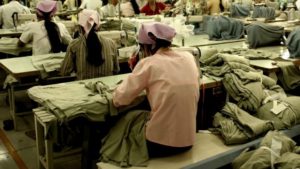Report urges end to modern slavery in Australia

New laws to stamp out modern slavery and the exploitation of workers are needed in Australia, according to a parliamentary committee’s report tabled this week in the Commonwealth Parliament.
The report, by the Joint Standing Committee on Foreign Affairs, Defence and Trade, recommends the development of a Modern Slavery Act along with the appointment of an independent Anti-Slavery Commissioner.
The news laws would also require large companies to eliminate forced labour and trafficking in supply chains.
The committee recommended provisions for a mandatory supply chain reporting requirement that requires large businesses to report on modern slavery risks in their supply chains.
Despite arguments from big business that the threshold should be greater than $100 million for mandatory reporting, the committee has recommended the threshold of $50 million in revenue.
“If you are a Woolworths or Coles and you’re sourcing a product, you need to look into your supply chain to ensure there is no modern slavery practices or labour exploitation, or debt bondage,” said committee chair Chris Crewther, MP.
“That will ensure there are not operators out there producing goods at a lower cost by doing the wrong thing, which puts out producers doing the right thing,” Mr Crewther said.
The Walk Free Foundation estimated in 2016, 45.8 million people worldwide were trapped in some form of slavery.
The report also recommended a national compensation scheme for victims of modern slavery.
The new legislation will reach out to overseas orphanages to protect the 80 per cent of orphan children who, in reality, have a family.
Overseas residential care agencies would have to register with the Australian Government, and Australians who wished to donate or volunteer would be able to check the register.
Under the proposed new laws, Labour hire contractors would have to be licensed to tackle the problem of coerced or debt bonded workers living in slave-like conditions.
Mr Crewther said the committee had found significant difficulties in the horticulture area and wherever labour hire contractors had been used.
“It doesn’t mean all are, but we need to tackle that,” he said.
The committee said terrible conditions for backpackers extending their 417 visa by working 88 days in a regional area and people in Australia on student visas had prompted a recommendation on tied visas.
“Eliminating or reducing the tied aspect of visas which give employers or others a say over a sign-off for their employees, which can often lead to a person be willing to or not having a choice as to exploitation, just to have their visa signed off,” the committee said.
Attention has been given to Pacific islanders who have been exposed to exploitation through the Federal Government-sanctioned seasonal worker program.
The report has recommended eliminating employer sign-off, which had left workers vulnerable to the power of contractors controlling the visa conditions.
The report also recommended new Pacific liaison officers.
Foreign Minister Julie Bishop has already committed to introducing legislation to combat modern slavery “as soon as possible.
“Slavery is one of the most appalling crimes in human history. Regrettably, the term ‘modern slavery’ reminds us that slavery and slavery-like practices are still prevalent around the world today, including here in Australia,” the report said.
“Modern slavery is often ‘hidden in plain sight’. These heinous crimes are present across a range of industries in Australia and in the global supply chains of businesses and organisations operating here,” it said.
“Latest estimates suggest that over 40 million people around the world, and 4,300 in Australia, are victims of some form of modern slavery, which includes human trafficking, slavery, debt bondage, forced labour and other slavery-like practices, the report said.
Laurie Nowell
AMES Australia Senior Journalist












